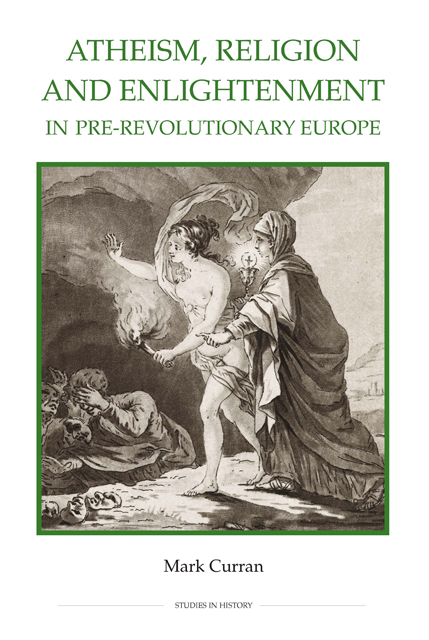Book contents
- Frontmatter
- Contents
- List of figures
- Acknowledgements
- Abbreviations
- Prologue
- Introduction
- 1 The virtuous atheist
- 2 The oral and written public sphere
- 3 Books and pamphlets
- 4 Periodicals
- 5 The philosophe response
- 6 Institutional reactions in France
- 7 The Christian Enlightenment?
- 8 Beyond the Christian Enlightenment
- Appendices
- Bibliography
- Index
6 - Institutional reactions in France
Published online by Cambridge University Press: 14 February 2023
- Frontmatter
- Contents
- List of figures
- Acknowledgements
- Abbreviations
- Prologue
- Introduction
- 1 The virtuous atheist
- 2 The oral and written public sphere
- 3 Books and pamphlets
- 4 Periodicals
- 5 The philosophe response
- 6 Institutional reactions in France
- 7 The Christian Enlightenment?
- 8 Beyond the Christian Enlightenment
- Appendices
- Bibliography
- Index
Summary
Philosophe concerns that the French authorities were attempting to launch a co-ordinated and concerted attack on irreligious publishing in 1770 were justified. During that year, at the height of d’Holbach’s anti-religious campaign, the king, the parlements, the Catholic Church hierarchy, the académie française and various academic institutions endeavoured to work together to produce a strong response. Each of them condemned d’Holbach’s works and declared that they would use all the resources at their disposal to repress them. However, these bodies had overlapping and ill-defined jurisdictions, as well as different priorities and motives for responding to the baron’s campaign. As a result, no coherent strategy emerged, and confused and conflicting messages were transmitted to the wider public regarding the best course of action. Before much progress had been made, the Maupeou crisis of 1771–4 effectively paralysed their combined efforts, further reducing levels of co-operation and pushing the question of irreligious publishing down the political agenda.
The Assembly of the Clergy was France’s foremost clerical body and was responsible for directing the Gallican Church’s response to d’Holbach’s publications. It met in Paris every five years (1765, 1770, 1775 and so on), and more frequently when deemed necessary, including in 1772 and 1774. The assembly was dominated by privilege and developed a reputation for being devoted to maintaining and increasing the power of the bishops. Its principal purpose was to vote taxation to the crown (the don gratuit), and in the years 1770, 1772 and 1774 especially large grants were made. Upon handing over these revenues, its members took the opportunity to present to the king their grievances on a range of subjects. During the 1760s and 1770s, these protests often centred on the threat that irreligious literature posed to religious commitment in France. The assembly of 1765, for example, had condemned works by Rousseau and Voltaire. Consequently, when their scheduled meeting came around in the spring of 1770, just as the Système de la nature affair was gripping Paris, it surprised few that speeches by the comte de Saint-Florentin and Mgr l’archevêque de Rheims quickly raised the issue of irreligious publishing. The king would have expected no less.
- Type
- Chapter
- Information
- Atheism, Religion and Enlightenment in Pre-Revolutionary Europe , pp. 110 - 124Publisher: Boydell & BrewerPrint publication year: 2012



